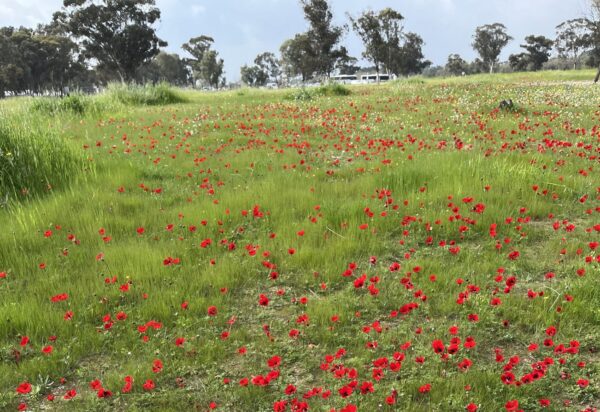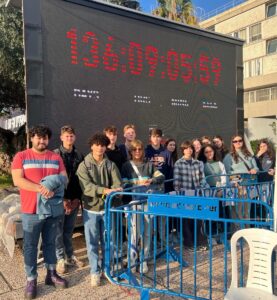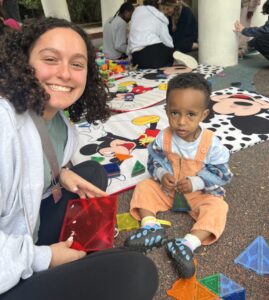
Eliana Rosen, a senior at West Essex High School, recently traveled to Israel as part of our Federation’s Teen Israel Leadership Council. To learn more about this unique two-year leadership development program for Greater MetroWest High school juniors and seniors, click here.
I felt goosebumps creep up my arms as the plane landed roughly on the tarmac. The lights in the cabin were dim, but through the window three seats to my left, I could see glimpses of bright Tel Aviv city lights. The El-Al pilot came into the intercom to announce the place I’d landed for the very first time: home.
As I sat in row 44G and felt the plane roll to our gate, I wondered what I’d learn and how it would feel to finally be in Israel, but at a time of so much hurt and loss. After the trip I can confidently tell you what I learned: the flowers are growing.
Our first day off the plane was the heaviest one, with visits to Sderot, Kibbutz Erez, Kibbutz Kfar Aza, and the site of the Nova Festival massacre. The once thriving communities were eerie ghost towns, seemingly untouched since the morning of the 7th of October.
We walked along rows of destroyed homes collapsing in on themselves, bullet holes piercing front doors. We saw remnants of rockets and burnt walls. I tried to imagine what this scene would have looked like four months before, the sun shining warmly, children running between these rows, and cheerful chatter between neighbors coming through the windows. At the Nova Festival site, we were haunted by hundreds of Israeli flags and personalized memorials staring back at us amongst faces of concertgoers frozen at ages not much older than ours.
I don’t think I’ll ever forget these images, their devastation is seared into my mind. But even more than the physical evidence from that dark day, the stories we heard will haunt me forever.
 From Gil Dichtman at Hostage Square, we learned the story of his cousin Yarden. She was taken hostage by Hamas after handing her daughter to her husband and telling them to run. When released in the first set of hostage deals, she told her family that the Hamas guards told her Israel was completely gone and that no one was fighting for her to come home. Gil’s cousin, Carmel Gat, is still being held in captivity.
From Gil Dichtman at Hostage Square, we learned the story of his cousin Yarden. She was taken hostage by Hamas after handing her daughter to her husband and telling them to run. When released in the first set of hostage deals, she told her family that the Hamas guards told her Israel was completely gone and that no one was fighting for her to come home. Gil’s cousin, Carmel Gat, is still being held in captivity.
We learned the story of Adi Vital Kaplon, who was murdered in her home, in front of her two children, on October 7th. Her father, who, through a series of miracles, survived that day, told us what it was like to hide in a safe room for 11 hours, and then come out to realize his daughter had been murdered and his grandchildren kidnapped. His grandchildren were released near the Gaza border. I looked around the room as he told his story, and everyone’s eyes had filled with tears.
Arab Israeli journalist Khaled Abu Toameh told us that he would rather go to Ramallah or the West Bank than face pro-Palestinian students again on the campus of the University of Michigan. Everyone in the room was speechless as the weight of our current reality sunk in.
But amidst all of this destruction, the kind of devastating destruction that makes you question everything you believed about the goodness of humanity, I noticed the wildflowers growing beneath my feet. There are dainty white ones growing in Kibbutz Erez, proud purple ones growing in Kibbutz Kfar Aza, and striking deep red ones growing at the site of the Nova festival massacre (pictured above). Flowers are growing. Things are being born anew, aided by the warm sunlight amongst the clouds above.
And so, more than the devastation and the loss and the grief (though those feelings I am sure will stay with all the teens for the rest of our lives) the tone of the trip was not only a somber one. We witnessed the flowers growing in the blood-soaked dirt, the phoenix rising from the ashes.
 We played with the children at Save a Child’s Heart, where patients from all over the world are receiving life-saving heart surgeries in Israel, and doctors are being trained to do the same in other countries. We visited Tikkun Olam Makers, an organization that makes affordable and accessible solutions for people with disabilities, including IDF soldiers and civilians injured on October 7 and in its aftermath. We splashed in waterfalls in Ein Gedi and danced with strangers at the Kotel. There is joy in Israel, there are impressive impacts being made on the world.
We played with the children at Save a Child’s Heart, where patients from all over the world are receiving life-saving heart surgeries in Israel, and doctors are being trained to do the same in other countries. We visited Tikkun Olam Makers, an organization that makes affordable and accessible solutions for people with disabilities, including IDF soldiers and civilians injured on October 7 and in its aftermath. We splashed in waterfalls in Ein Gedi and danced with strangers at the Kotel. There is joy in Israel, there are impressive impacts being made on the world.
It’s not to say that the flowers growing in Israel negate the destruction. That’s far from the truth. But as the flower bouquets sold at grocery stores can be brought to celebrations or tragedies, so can the wildflowers growing amongst the makeshift tombstones. Nature is rebuilding and the country with it. Because in Israel, flowers are growing.
Throughout the trip, we were thanked for coming. We planted cherry tomatoes at Moshav Shekef, set the Shabbat table at the Michael Levin Lone Soldier Base and made dinner at an active IDF base with the Barbecue Brigade. But mostly, we were thanked simply for supporting Israel even when it’s hard.
In some ways it was strange for this to be my first trip to Israel, the country I’ve dreamed of visiting since I learned the Hatikvah in Hebrew school and celebrated Yom Yisrael decked out in white and blue at sleepaway camp. But, visiting Israel in this difficult time only further demonstrated to me the resilience, strength, and beauty of the country. I saw the flowers of Israel begin to bloom, and I’ll be back to watch them in full blossom.

